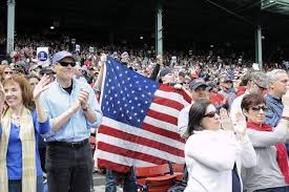 I go to shul to pray in community nearly every Shabbat. I go to Nats Stadium to watch and root in community a number of times a year. And I read the sports section of the Washington Post nearly every day. After the Boston bombing I started thinking about the idea of community and what it means to be a part of one. And then sportswriter Tracee Hamilton wrote about that very subject. I read her paper - she must have been reading my mind. The article pointed out just how vulnerable spectators are at sporting events, and that perhaps one day soon, partly because of security concerns. people may choose to stay home. That would be a great loss she notes, because being a member of a sports community is all that some people have. Where would that choice leave many? Plugged into personal communication devices that estrange us from a sense of community. (Maybe some day someone will invent the wePad) Interestingly, a reader wrote to the Post objecting to Hamilton’s premise about loss of community. “Isn’t the online community a community?” he asked. I am not going to comment on that, but rather look to last week’s Torah portion for guidance, where at the beginning of Parshat Kadoshim G!d says “You shall be holy”. The word “you” is stated in the plural, and the declaration is meant to be addressed by Moshe to "adat Yisrael", the entirety of the congregation of Israel. The Chatam Sofer comments that this holiness refers to holiness that can only be attained in community, holiness that springs forth from relationship with one’s neighbor. (“v’ahavta, rey’echa kamocha” - love your neighbor as yourself - appears a few lines later) The Chatam Sofer is teaching that we should seek G!d in community, that isolating oneself in the search for holiness is not the ideal. I suspect that the Rebbe never once went to a ballgame.
2 Comments
Claude Brachfeld
4/22/2013 08:31:26 am
Reb Marko, I applaud your implied distinction between the so-called online community and those that exist in reality. Love your "neighbor" (or "fellow") is not a commandment that has meaning for those who interact only electronically and may not really even know one another's identity. But I would go a step further and suggest that the "sports community" of fans, while it is not without value for its participants (indeed, it may be "all that they have") is inferior to other types of community, those characterized by mutual understanding and active support of its members who share a culture, history and goals rather than just an affinity. Consider the difference between sports fans at a stadium and the members of, say, a recreational softball team. Then go a step further and consider the impact of community on members of a kahal, who take with them the values cultivated within their community into their lives outside, in the broader society. Each of these groupings brings value to its participants, but I'd submit that there is a hierarchy, and that we should strive to support those communities which do the most to sustain our relations to one another and thereby enrich society as a whole. Which doesn't mean that we shouldn't enjoy the game as well, of course.
Reply
Beaitiful post Claude, thank you for that reminder. I did a little research while I was working on the blog post, and came upon an organization that you might be interested in
Reply
Your comment will be posted after it is approved.
Leave a Reply. |
Mark Novak is a "free-range" rabbi who lives in Washington DC and works, well, just about everywhere. In 2012 he founded Minyan Oneg Shabbat, home to MOSH (Minyan Oneg Shabbat), MindfulMOSH (Jewish mindfulness gathering), and Archives
June 2017
Categories
All
|
 RSS Feed
RSS Feed
